Statement
Statement summary
ABDOULAYE WADE, President of Senegal, said humankind faced a convergence of difficulties in the agricultural, financial and economic and climate crises, as if the difficulties “had arranged to meet in one place at the same time”. The world was condemned to prevail, as indeed it must. The only question was how to coordinate the numerous actions needed to do so. A high level of shared responsibility was required in the search for solutions, particularly in managing the immediate impacts of the concurrent crises and in searching for long-term remedies. Ready-made solutions should be rejected and past mistakes avoided. Human behaviours and attitudes must be changed, particularly with regard to combating climate change.
Stressing that Africa should participate fully in that work, he welcomed the expansion in the level of cooperation within the G-8 and the G-20. A “shadow G‑20”, comprising experts and open to all, was called for. It was also appropriate that the theme of the sixty-fourth Assembly session stressed multilateralism in effectively responding to the world crises. Indeed, the challenges were complex, requiring coordinated and innovative solutions, particularly in the areas of agriculture and food security. The on-time achievement of the main Millennium Development Goal of halving poverty required a new approach, founded on support for agriculture.
To that end, production and storage lines as well as the marketing of agricultural products must be modified, he said, announcing that a forum on world agriculture, to be held in Dakar in January 2010, would seek to advance ideas on how to do so. Also important in those efforts was the global partnership for food security proposed by the G-8. If those changes were made, there was no reason why Africa would not be able to feed itself. That was particularly true given its wealth of land. However, it would only be possible if Africans no longer sold those lands to foreigners. For its part, Senegal had developed the “Great Agricultural Offensive for Food and Abundance” as one instrument in its food security arsenal. Yet domestic efforts would be in vain if the international trade system remained unjustly structured. Measures should be undertaken to make that system more equitable.
The Climate Change Summit earlier this week had reinforced the sense that the threat would persist unless consumption and production patterns changed, he said. At the dawn of a new green economy, Africa wished to take on its responsibilities. That was Senegal’s goal in coordination with the construction of the “Great Green Wall”, which would eventually run from Dakar to Djibouti and be planted with flora native to the Sahel region. Moreover, the possible creation of climate change missions that were similar in spirit to peacekeeping missions should be considered. Such a volunteer army of “environmental troops” would seek to implement large-scale environmental projects. One such project was the creation of an Atlantic erosion wall in West Africa.
He went on to emphasize the need for African unity, which was the only way for the continent to meet the challenges of globalization and the redefinition of world governance rules. On issues of regional peace and security, he welcomed the gradual restoration of stability in Guinea-Bissau, as well as the “Dakar Accord” which had normalized the situation in Mauritania. However, Senegal remained concerned about the situation in Guinea, where a dialogue that included the military was needed.
Full statement
Read the full statement, in PDF format.
Photo

Previous sessions
Access the statements from previous sessions.
